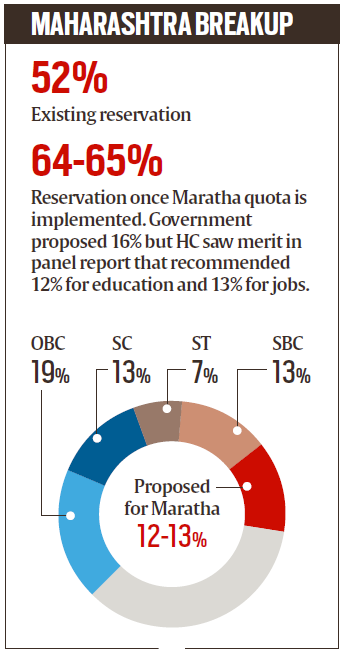On 5 May 2021, the Supreme Court struck down the Maharashtra State Reservation for Socially and Educationally Backward Classes Act, 2018. Firstly, let's take a look at the provisions of the law and then we would focus upon its criticisms/support and the complete judicial process related to this act in some detail.
BACKGROUND
The demand for Maratha reservation had been pending since the 1980s which increased over the years and when a number of political promises failed to deliver, this demand took the form of widespread protests. Maharashtra saw about 58 rallies and protests in the span of 2016-17 organized by the Marathas under the banner of Maratha Kranti Morcha. The major demands of these rallies included:- justice for a 15-year girl from Kopardi who was raped and killed in Ahmednagar district of Maharashtra, waiving the farmer loans and reservation for the Maratha community in government jobs and educational institutions. In the second phase of protests that followed, the degree of violence of these protests increased and even led to some suicides demanding reservation. The demand for reservation became the key point of the 10-point charter of demands presented at the end of these protests and the Marathas were not looking to settle down until their demand of reservation was fulfilled.
GAIKWAD COMMISSION AND SUBSEQUENT LEGISLATION
In response to the growing aggression and violence in these protests, the ruling BJP government of Maharashtra at the time formed an 11-member committee and appointed Retired Justice MG Gaikwad as its head. According to the report submitted by the committee, Marathas were identified under Socially and Economically Backward Class(SEBC). Subsequently, the Maharashtra legislature unanimously passed the bill in November 2018 which provided 16% reservation to the Maratha community in jobs and education. The breakdown of reservation is as following:-
BOMBAY HIGH COURT JUDGEMENT
The act was challenged by a PIL in Bombay High Court, which upheld the reservation stating that the 102nd amendment under Article 342A of the Indian constitution does not limit the states' power to identify some groups under SEBC and hence the states can extend the reservation to these groups. However, it brought down the reservation to 12 per cent in education and 13 percent in jobs, instead of 16 percent.
THE SUPREME COURT JUDGEMENT AND REFERENCE TO INDRA SAWHNEY JUDGEMENT(1992)
Not satisfied with the Bombay HC decision to uphold the Maratha reservation law, individuals from all walks of life and NGOs appealed against this decision in the Supreme Court. Their demand was to bring down this act since this act violated the Supreme Court judgement passed in 1992 in the Indra Sawhney & others v. Union of India case.
The Indra Sawhney case judgement(1992) restricted the upper limit of reservation to 50 percent of jobs and education and stated that any change in this limit would be justified only under extraordinary circumstances.
Hence with reference to the same judgement, The Supreme court in its judgement on 5th May stated that exceeding the reservation above 50 percent would be a direct violation of the objective of equality as engrafted in the Article 14 of which Article 15 and 16 are facets.
To quote Article 14 of The Constitution of India,
"14. The State shall not deny to any person equality before the law or the equal protection of the laws within the territory of India."
Check out Article 15 and Article 16.
The five-judge bench also stated that the Gaikwad commission did not state any exceptional arguments to justify the increase in the 50 percent limit set by the Indra Sawhney judgement. The bench also said that providing reservation for the advancement of any socially and educationally backward class is not the only way and states should also focus on providing better educational facilities and skill development opportunities at a lower cost to people belonging to these classes.
AFTERMATH AND FUTURE IMPLICATIONS
The bench also rejected the demand to revisit the verdict or to refer it to a larger bench for reconsideration. Since the appeal was first heard in the Supreme Court on 9 September last year, the bench stated that any admissions to engineering, medical and other streams prior to the above mentioned date would not be affected. The Maratha Kranti Morcha termed this judgement as "unacceptable" and held the ruling government responsible for not providing documentary proofs in order to solidify the case before the Supreme Court. So, it would not be incorrect to say that this judgement can have serious socio-political implications in the future as the demand for reservation might manifest in new forms of politics and protests.



No comments:
Post a Comment